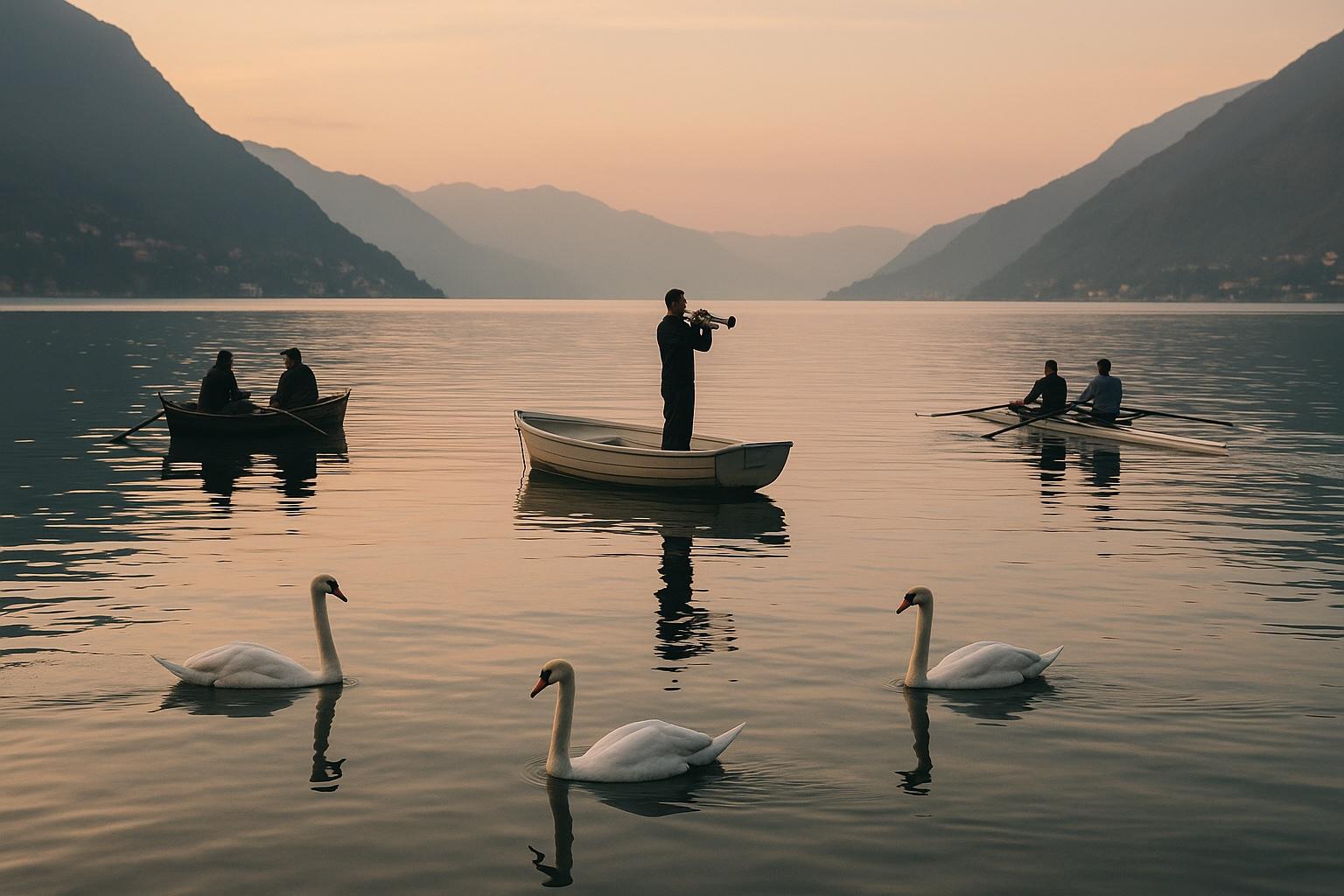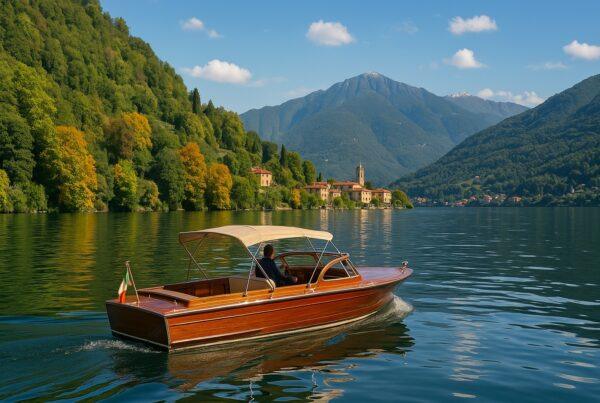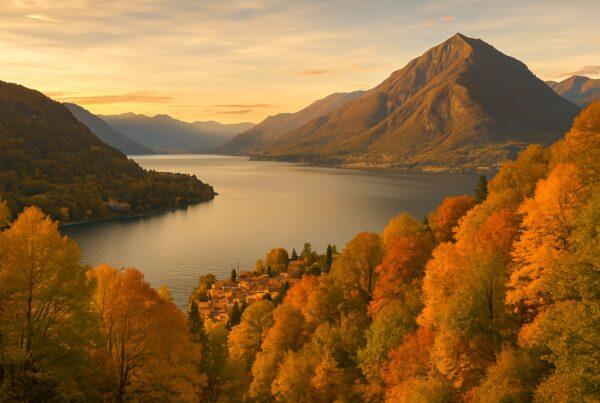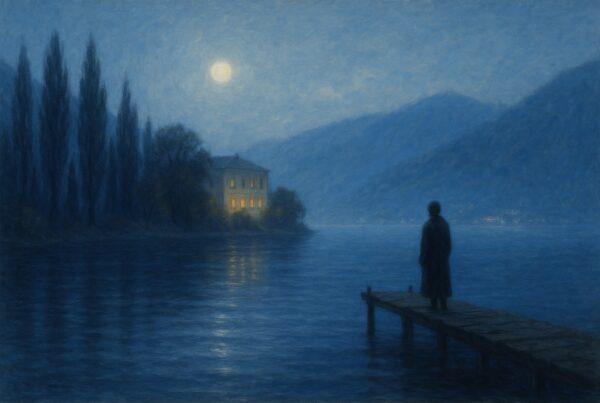Long before ferries start crossing and before cafés open their doors, Lake Como belongs to silence. At dawn, when the first light brushes the peaks and the villages are still wrapped in sleep, the lake is alive only with fishermen. Their small boats, almost invisible in the soft gray light, slide across the water without hurry. The air is fresh, the surface is calm, and every sound seems magnified: the splash of an oar, the creak of wood, the gentle murmur of nets being pulled.
The rhythm of another time
Fishing on Lake Como is not only a trade—it is a tradition that has shaped the rhythm of life along the shores for centuries. The day begins when others are still dreaming. Between three and five in the morning, fishermen push their boats into the dark, guided only by the stars or the faint outline of mountains against the sky. Their gestures are repetitive and timeless: setting the nets, checking the lines, pulling in the catch with steady, patient movements. Each action echoes generations before them, fathers teaching sons, stories whispered on the water.
A landscape painted with silence
From the boat, the lake at dawn is another world. The mountains seem higher, the villages smaller, and the water stretches like a sheet of glass reflecting the first colors of the day. Bells toll softly in the distance, announcing hours that no one else hears. The fishermen’s boats create delicate ripples that spread in circles, breaking the perfect stillness. Sometimes fog hovers low, wrapping everything in a veil that makes sounds feel even more distant, as if the lake were holding its breath.
The fish of tradition
The catch reflects the character of the lake itself. Agoni, lavarelli, perch—names that resonate in both fishermen’s baskets and in the kitchens of local trattorie. These species are more than ingredients; they are symbols of continuity. The famous missoltini, salted and dried agoni, tell of a preservation method that allowed communities to endure long winters. Fried perch fillets, paired with risotto, are perhaps the most iconic dish connecting visitors to the lake’s culinary identity. Each fish pulled from the nets carries with it both sustenance and history.
Between past and future
Modern life has not erased these rituals, though the number of fishermen has diminished. Some work professionally, licensed and regulated, while others keep the practice alive as passion or heritage. There are challenges—environmental changes, tourism pressures, evolving tastes—but the sight of a boat silhouetted against the morning light reassures that a thread remains unbroken. Watching them, one feels that the lake itself would not be the same without their presence.
For those who wish to witness
Visitors rarely experience this side of Lake Como. It requires early rising, patience, and the willingness to exchange the comfort of a late breakfast for the chill of dawn. Yet those who walk along the shores at first light or who stay in a lakeside room with windows open to the water can glimpse the scene. A lantern glowing in the distance, a silhouette leaning over nets, the quiet return of boats as the sky brightens—these are rewards for those who choose silence over spectacle.
An unexpected sound
Sometimes, silence is not complete. Alongside the fishermen’s nets and the slow rhythm of the oars, another voice occasionally rises: that of a trumpet. In Domaso, locals know of the solitary musician who takes his small boat onto the water at dawn and lets jazz drift across the lake. The sound mingles with the calls of swans and the creak of wooden hulls, creating a surreal concert where nature and music meet. For those lucky enough to hear it, it is a reminder that Lake Como is not only a landscape to see, but also a place where creativity finds its own stage.
The return to daily life
By the time the villages begin to stir, with church bells ringing louder and shutters opening one by one, the fishermen are already returning. Their boats dock quietly, catches are brought ashore, and the day begins anew. The lake slowly shifts from private to public space, from silence to movement. Tourists will board ferries, children will play by the water, cafés will fill with chatter. But for a few hours each morning, the lake belonged to another rhythm: one of patience, tradition, and quiet dialogue between man and nature.
A fleeting, timeless scene
Silent mornings on Lake Como are a reminder that beauty is not always loud, and that some of the most authentic experiences are the least accessible. To sit by the water as the fishermen work is to step into a ritual that has endured for centuries, fragile yet resilient. It is a chance to see the lake not as a postcard but as a living space, still tied to the gestures of those who know its secrets best.
And when the sun finally climbs above the peaks, casting gold across the surface, the fishermen vanish back into their villages. The silence lifts, the lake awakens, and the brief, magical moment when the water belonged only to them dissolves into memory.




